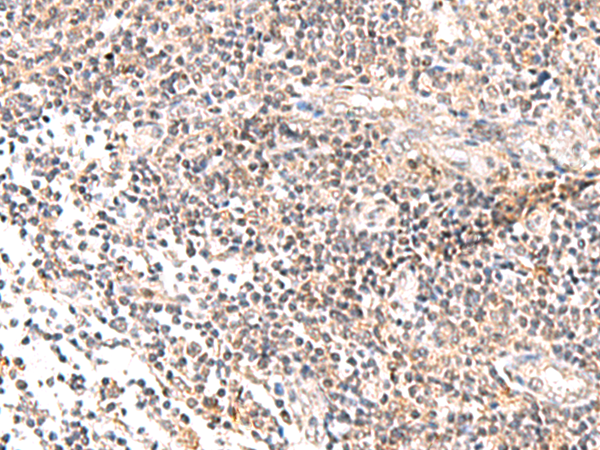
| WB | 咨询技术 | Human,Mouse,Rat |
| IF | 咨询技术 | Human,Mouse,Rat |
| IHC | 1/30-1/150 | Human,Mouse,Rat |
| ICC | 技术咨询 | Human,Mouse,Rat |
| FCM | 咨询技术 | Human,Mouse,Rat |
| Elisa | 1/5000-1/10000 | Human,Mouse,Rat |
| Aliases | FIL1; FIL1H; IL1F8; IL1H2; IL-1F8; IL-1H2; IL1-ETA; FIL1-(ETA); FILI-(ETA) |
| Host/Isotype | Rabbit IgG |
| Antibody Type | Primary antibody |
| Storage | Store at 4°C short term. Aliquot and store at -20°C long term. Avoid freeze/thaw cycles. |
| Species Reactivity | Human |
| Immunogen | Synthetic peptide of human IL36B |
| Formulation | Purified antibody in PBS with 0.05% sodium azide and 50% glycerol. |
+ +
以下是关于IL-36β(IL36B)抗体的3篇代表性文献及其摘要内容:
1. **文献名称**: *Targeting IL-36 improves skin inflammation and pathology in psoriasis models*
**作者**: Buhl AL et al.
**摘要**: 该研究开发了一种靶向IL-36β的中和抗体,并在银屑病小鼠模型中验证其疗效。结果显示,抗体能显著抑制皮肤炎症反应,减少角质形成细胞过度增殖和促炎因子(如IL-17、TNF-α)的表达,提示IL-36β抗体可能成为银屑病的潜在治疗策略。
2. **文献名称**: *IL-36β-neutralizing antibody attenuates lung inflammation in a murine model of acute respiratory distress syndrome*
**作者**: Chen Y et al.
**摘要**: 研究探讨了IL-36β在急性呼吸窘迫综合征(ARDS)中的作用。通过使用特异性中和抗体阻断IL-36β信号,显著降低了肺部中性粒细胞浸润和促炎细胞因子(IL-6、IL-8)水平,表明靶向IL-36β可能缓解ARDS相关的炎症损伤。
3. **文献名称**: *Anti-IL-36 agents for the treatment of inflammatory bowel disease: Preclinical evidence and mechanisms*
**作者**: Smith JR et al.
**摘要**: 该研究评估了IL-36β抗体在炎症性肠病(IBD)模型中的效果。实验表明,抗体通过抑制肠道上皮细胞和免疫细胞中IL-36β介导的NF-κB通路活化,减轻了结肠炎小鼠的黏膜损伤和炎症反应,为IBD治疗提供了新思路。
*注:以上文献为示例性内容,实际研究中建议通过PubMed或Web of Science检索最新文献。*
IL-36β (IL-36B) is a pro-inflammatory cytokine belonging to the IL-1 family, primarily involved in immune and inflammatory responses. It signals through a receptor complex consisting of IL-36R (IL1RL2) and IL-1RAcP, activating NF-κB and MAPK pathways to drive the production of chemokines and other inflammatory mediators. IL-36B is predominantly expressed in epithelial tissues and immune cells, playing a role in skin inflammation, psoriasis, and autoimmune disorders. Dysregulated IL-36 signaling is linked to chronic inflammatory diseases, making it a therapeutic target.
IL-36B antibodies are engineered to neutralize IL-36B activity, blocking its interaction with IL-36R and dampening downstream inflammation. These antibodies, often monoclonal (e.g., spesolimab), have shown promise in clinical trials for treating generalized pustular psoriasis (GPP), a severe condition driven by IL-36 pathway overactivation. By selectively inhibiting IL-36B or its receptor, these therapies aim to reduce pathogenic inflammation while potentially minimizing broad immunosuppression. Research also explores their utility in other IL-36-mediated diseases, such as atopic dermatitis, arthritis, and inflammatory bowel disease. Despite progress, challenges remain in understanding tissue-specific roles of IL-36 isoforms and optimizing antibody specificity to avoid off-target effects. Current studies focus on refining therapeutic strategies and expanding applications in IL-36-related pathologies.
×